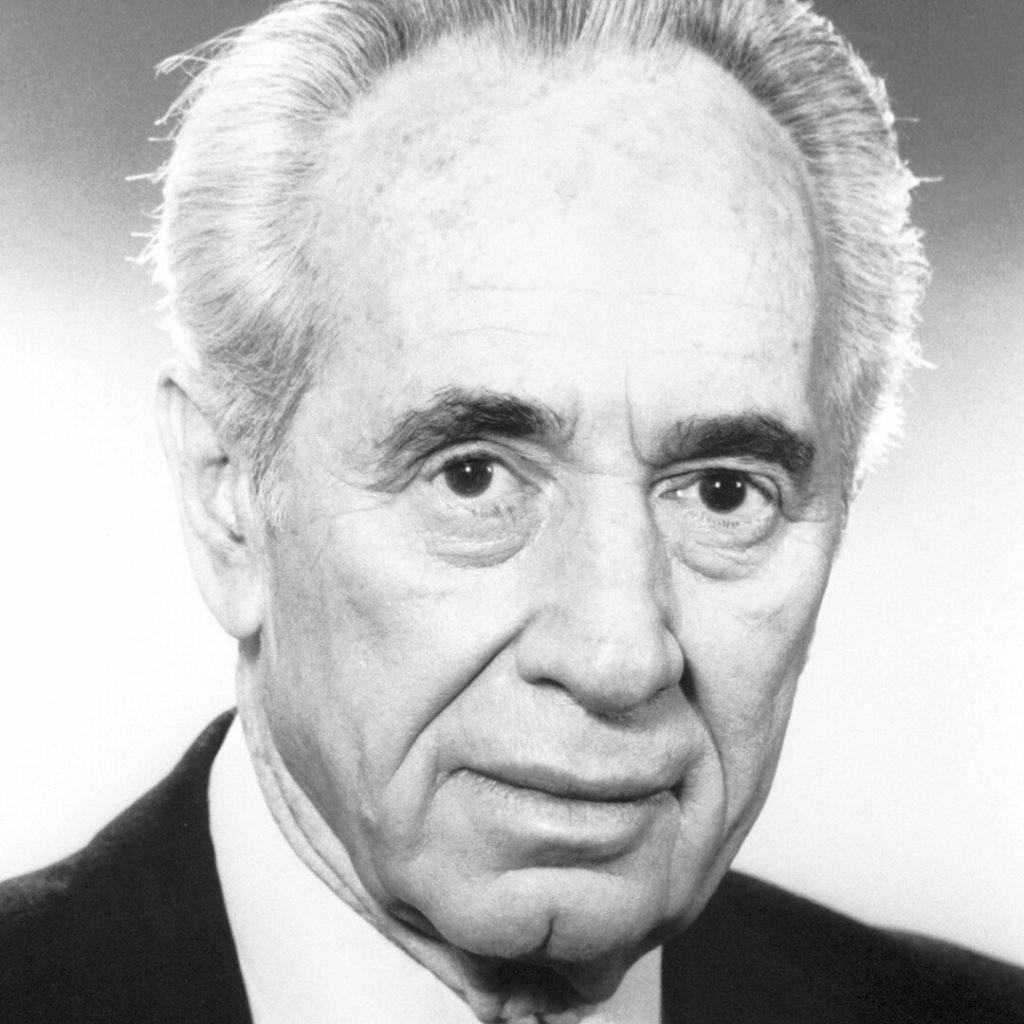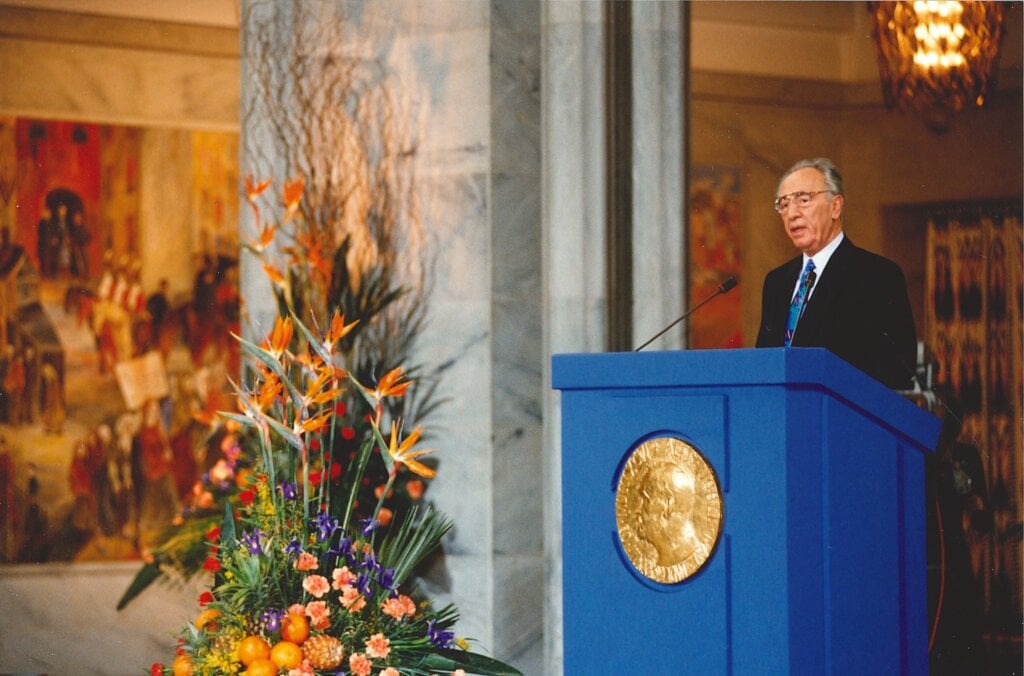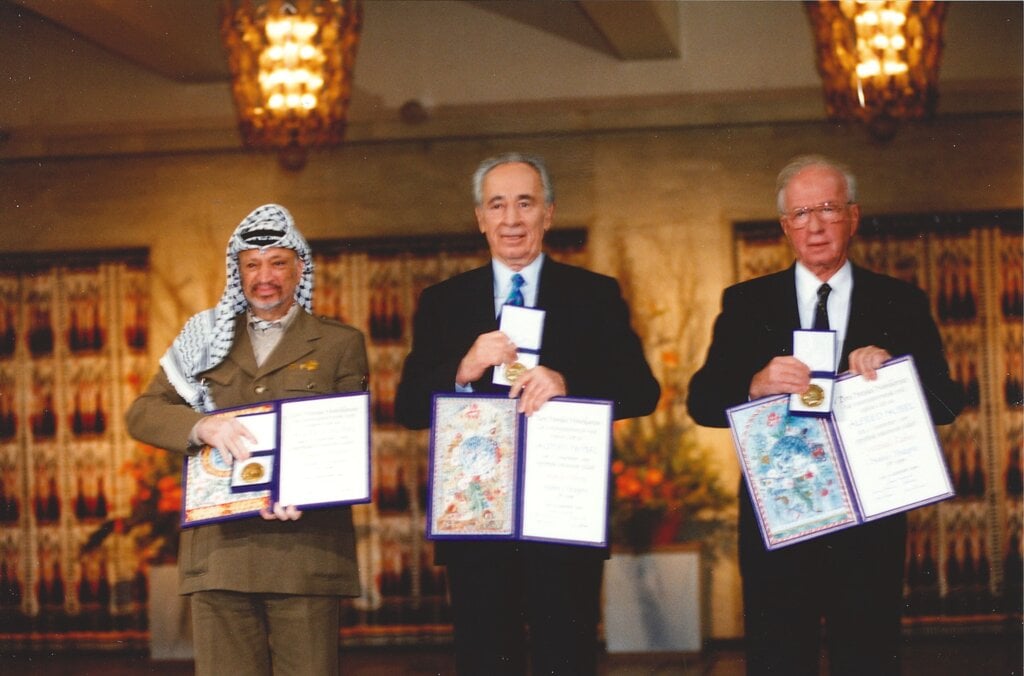Shimon Peres
Speed read
Shimon Peres was awarded the Nobel Peace Prize jointly, with Yitzhak Rabin and Yasser Arafat, for his efforts to create peace in the Middle East.

Full name: Shimon Peres
Born: 16 August 1923, Vishneva, Poland (now Belarus)
Died: 28 September 2016, Tel Aviv, Israel
Date awarded: 14 October 1994
Reconciling with the Palestinians
When the Arab-Israeli war broke out in 1948, Shimon Peres was made responsible for procuring military equipment from abroad. Considered the father of the Israeli atom bomb, he also organised Israel’s nuclear research programme. Peres had political ambitions, but was not part of the government when Israel conquered Palestine in 1967. He finally became prime minister in 1984. Peres and the Labour Party were opposed to incorporating all the occupied territories. In 1992, Peres became foreign minister in a new government. He led the Israelis in the secret negotiations with the PLO in Norway that resulted in the Oslo Accord, which gave Palestinians self-rule. In 1994, Peres was awarded the peace prize together with Israeli Prime Minister Yitzhak Rabin and Palestinian leader Yasser Arafat.
| Oslo Accord Peace treaty between Israel and the Palestinian Liberation Organisation (PLO) negotiated in Oslo in 1993. Most importantly, the parties officially recognised one another and agreed that negotiations should replace the use of weapons. |
"Slings, arrows, and gas chambers can annihilate man, but cannot destroy human values, dignity and freedom."
Shimon Peres, Nobel Prize lecture, 10 December 1994.

"... it was Shimon Peres who persuaded Ben Gurion in 1956-57 that the time was right to initiate the nuclear project. From the beginning Peres was entrusted by Ben Gurion to lead Israel’s pursuit of a nuclear capability."
Avner Cohen: 'Israel and the Bomb'. Page 17, Columbia University Press. 1998.
Peres, father of the Israeli atom bomb
Israel won the 1948-49 Arab-Israeli war. But victory did not lead to peace. The Arab nations refused to recognise the state of Israel, which had been established on their territory, and they thirsted for revenge. In the mid-1950s, Prime Minister Ben Gurion and Shimon Peres felt that Israel needed nuclear weapons as a deterrent to Arab aggression. Peres procured technical equipment from France and deuterium from Norway. In all secrecy the Israelis constructed a nuclear reactor. To this date (2011), Israel has neither confirmed nor denied that it possesses nuclear arms, but the general consensus is that it does.
| Heavy water Popular term for deuterium oxide. A clear odourless and tasteless liquid with greater density than water. Heavy water is produced by adding large amounts of electricity to water and/or hydrogen. Heavy water is used in atomic reactors. |
Peres as prime minister
In the 1970s, Peres tried to become prime minister, but did not succeed until 1984. He held the post for only two years, yet managed during that time to withdraw Israeli forces from most of Lebanon. Menachem Begin’s right-wing government had ordered the invasion of Lebanon in an effort to crush the PLO. Peres hoped to become prime minister again when the Labour Party won the 1992 election, but was forced to yield to Yitzhak Rabin. He assumed the post after Rabin’s assassination in 1995. He was forced to step down a year later, when the right wing won the election in protest against Peres and Rabin’s peace treaty with the Palestinians.
A vision for the Middle East
In his 1994 Nobel Prize lecture in Oslo, Peres expressed the following goal: “Israel’s role in the Middle East should be to contribute to a great, sustained regional revival. A Middle East without wars, without enemies, without ballistic missiles, without nuclear warheads.” He envisioned peaceful cooperation between the countries in the Middle East similar to the cooperation within the EU. He opposed the right wing’s desire to annex the West Bank and Gaza. He believed that this would fuel further enmity and that, in time, due to high Palestinian birth rates, Jews would become a minority in Israel.
"By concluding the Oslo Accords, and subsequently following them up, Arafat, Peres and Rabin have made substantial contributions to a historic process through which peace and cooperation can replace war and hate."
The Norwegian Nobel Committee, Announcement, 1994.
Peres and the Oslo Accord
The Oslo Accord between the Palestinians and the Israelis was signed in Washington, DC, in the autumn of 1993. Its aim was to reconcile the two peoples. Israel and the PLO officially recognised one another, and the Palestinians were promised a gradual transition to self-rule. Foreign Minister Shimon Peres was responsible for negotiations on the part of the Israelis, and convinced Prime Minister Yitzhak Rabin to support a peace treaty with Palestinian leader Yasser Arafat. Therefore all three shared the 1994 Nobel Peace Prize.

Learn more
Shimon Peres (Labour), Minister of Foreign Affairs, was born in Poland in 1923 and immigrated with his family as a child. He studied at the Ben Shemen Agricultural School, and was one of the founders of Kibbutz Alumot in the Jordan Valley ...
Disclaimer: Every effort has been made by the publisher to credit organisations and individuals with regard to the supply of photographs. Please notify the publishers regarding corrections.
Nobel Prizes and laureates
Six prizes were awarded for achievements that have conferred the greatest benefit to humankind. The 12 laureates' work and discoveries range from proteins' structures and machine learning to fighting for a world free of nuclear weapons.
See them all presented here.
